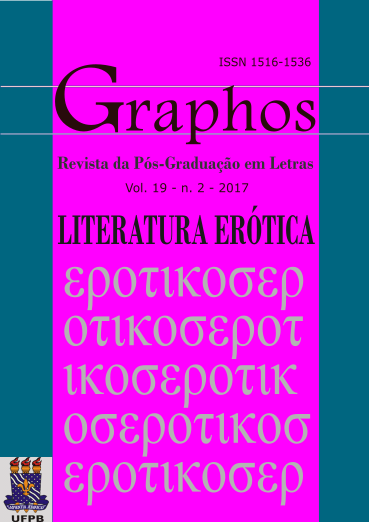Traditional family’s laceration through consummation of desire in O casamento, by Nelson Rodrigues
Keywords:
Psychoanalysis, Family, Desire, Nelson RodriguesAbstract
In 1966, peak moment during Brazil's military dictatorship, Nelson Rodrigues had his novel O Casamento censored just one month after its publication. Through a decree signed by Carlos Medeiros Silva, Minister of Justice Marshal Castello Branco, on October 12th, came the order to remove the novel from all Brazilian libraries, under the allegation that the narrative was filled with "turpitude and scenes depicted with incredibly indecorous language." a truly "affront against family's organization" (RODRIGUES, 2016, p. 264). Fifty years past the publication of the novel, the only one to be signed by the most acclaimed modern Brazilian play-writer, we still can see how the issues addressed in O Casamento still continue to shake Brazilian moralism. By representing a traditional family during the preparations for one of its member's wedding ceremony, Nelson Rodrigues showcases, as pointed by Alexandre Pianelli Godoy (2012, p. 106), the paradox between "the feeling of discredit of the family as an institution, inside the own family" and the inversely proportional, ideological valorization of conservative and patriarchal dogmas by the family members. In this regard, we intend, in this paper, to analyze how the characters of the novel deal with the authoritarian, religious, misogynist and homophobic norms, that directly affront their conscious or unconscious desires of masochism, sadism, exhibitionism, voyeurism, homosexuality, incest, adultery and rape. Once the traditional bourgeoisie family drama is depicted, divided between normalization and secularization, we will comprehend the tensions derived from conflicting desires of "morality" and "immorality" based on Freudian Psychoanalysis, through works as Totem e tabu (2012), O mal-estar na civilização (2010) and Os três ensaios sobre a teoria da sexualidade (2016), which question the construction of social restrictions related to sex, the sacrifice of one's individual desires at the expense of collective harmony and the way sexuality as a whole is established, respectively. As pointed by Edmundo Gómez Mango & J-B Pontalis (2013), as well as by Jean Bellemin-Noël (1978, p. 19), we believe that the psychoanalytical theory is fundamental in the process of deciphering the code in which the literary text is transformed into. In addition to psychoanalytical references, other researches will contribute to our goals, such as the ones developed in the field of literature by Sábato Magaldi (1992), Jean-Marie Thomasseau (2012), Alexandre Godoy (2012), Victor Pereira (2012), Ângela Dias (2013), among others. During the development of this paper, we present findings that direct the characters' desires to punishable situations, guilt, hypocrisy, crime, death, tragedy and discredit of the family institution, as the title of novel appears to be the representation of an organizational structure that calls into question the most controversial parts of human life: eroticism and sexuality.
Downloads
References
DIAS, Ângela Maria. A forma da emoção. Rio de Janeiro: 7Letras, 2013.
FREUD, Sigmund. “Totem e tabu”. In: Totem e tabu, contribuição à história do movimento psicanalítico e outros textos (1912-1914). São Paulo: Companhia das Letras, 2012.
__________. “O mal-estar na civilização”. In: O mal-estar na civilização, novas conferências introdutórias à psicanálise e outros textos (1930-1936). São Paulo: Companhia das Letras, 2010.
__________. “Três ensaios sobre a teoria da sexualidade”. In: Três ensaios sobre a teoria da sexualidade, análise fragmentária de uma histeria (“O caso Dora”) e outros textos (1901- 1905). São Paulo: Companhia das Letras, 2016.
GODOY, Alexandre Pianelli. Nelson Rodrigues: o fracasso do moderno no Brasil. São Paulo: Alameda, 2012.
MAGALDI, Sábato. Nelson Rodrigues: dramaturgia e encenações. São Paulo: Perspectiva, 2010.
MANGO, Edmund Gómez & J-B. Pontalis. Freud com os escritores. São Paulo: Três Estrelas, 2013.
MARACAJÁ, Myrna Agra. “Parentalidades à la carte e a utopia pós-sexual”. In: SILVA, Antonio de Pádua Dias da (Org.). Literatura contemporânea e homoafetividade. João Pessoa: Realize Editora; Editora Universitária da UFPB, 2011.
OLIVEIRA, Cibelle Araújo & SILVA, Enaura Quixabeira Rosa. “O poder destruidor do desejo”. In: TOMAZ, Jerzuí Mendes Tôrres & MALUF, Sheila Diab (Org.). O legado de Nelson Rodrigues: reflexões. Maceió: EDUFAL, 2012.
PEREIRA, Victor Hugo Adler. Nelson Rodrigues, o freudismo e o carnaval nos teatros modernos. Rio de Janeiro: 7Letras, 2012.
RODRIGUES, Nelson. O casamento. Rio de Janeiro: Nova Fronteira, 2016.
__________. “Vestido de noiva”. In: Teatro completo de Nelson Rodrigues 1: peças psicológicas. Rio de Janeiro: Nova Fronteira, 1981a.
__________. “Álbum de família”. In: Teatro completo de Nelson Rodrigues 2: peças míticas. Rio de Janeiro: Nova Fronteira, 1981b.
__________. “O beijo no asfalto”. In: Teatro completo de Nelson Rodrigues 4: tragédias cariocas. Rio de Janeiro: Nova Fronteira, 1989.







